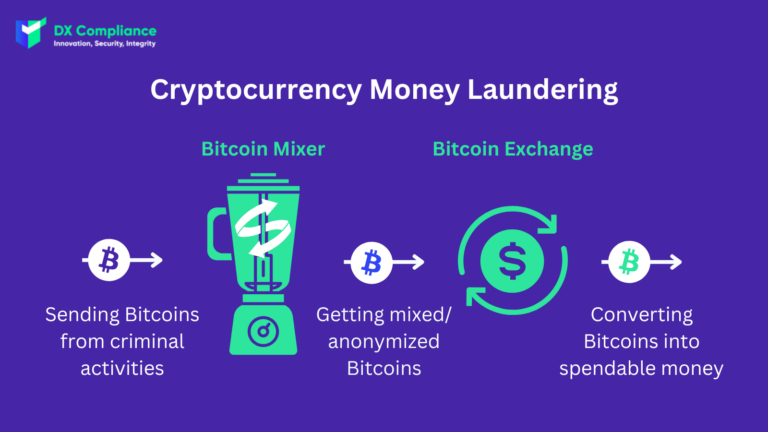17 October 2022, 15:00
Tagline
17 October 2022, 15:00
Tagline
The cryptocurrency, Bitcoin, has created some controversy to the payment system industry since it was introduced in 2009. Virtual currency holds a digital value that allows users to send money across the world without conventional banking systems. It can be traded but does not have legal tender status, whereas fiat currency covers all physical, paper and coin, currency globally.
Cryptocurrency, according to the FATF report, Virtual Currencies, has gained attention for two main reasons: it can be seen as the future for payment systems, however, on the other hand it provides a powerful nesting ground for criminals, terrorist financiers and money laundering. One main reason for this is that they are not in the control of any law enforcement or authority.
Without official regulation, cryptocurrency can lends itself to be a platform that attracts criminal trading. It can be used as a vehicle to convert funds gained illicitly into cryptocurrency, and eventually to clean money. Virtual currency relies on users to trade with high levels of anonymity.
Cryptocurrencies do not require identification or verification and it can be exchanged into fiat money. The higher level of anonymity within cryptocurrencies than traditional payment systems is a huge attraction to criminals. Cryptocurrency is generally traded online and so this stretches out the anonymity. Historical records of transactions are not associated to individuals and so they do not impact the criminals’ real life. Moreover, these customer and transaction records are often held by different entities which makes is hard for law enforcement to access them.

To explain how Cryptocurrency Money Laundering works, we focus on Bitcoins as an example: In general, Bitcoin mixing services and Bitcoin exchanges are often used for cryptocurrency money laundering with Bitcoins.
As the name Bitcoin mixing implies, it refers to services that mix BTC deposited by multiple entities and transfer the resulting anonymized BTC back to wallet addresses specified by the depositors.
Many Bitcoin Mixers additionally mix deposited BTC with their own BTC reserves. In addition, they usually offer to transfer the BTC with a time delay, which increases anonymity even more.
The BTC thus separated from the criminal activities are then anonymously converted into spendable money via a Bitcoin exchange and paid out.
Bitcoin mixing services thus enable fraudsters to disguise the origin of their ill-gotten gains.
Criminals can use virtual currency systems because without the use of conventional financial systems they do not have to pass money laundering regulatory checks. The FATF published a report, Virtual Assets Red Flag Indicators of Money Laundering and Terrorist Financing, which outlines common red flags used to identify suspicious activity through cryptocurrencies.
Similar to other new payment methods, cryptocurrencies have legitimate benefits. It aims to improve efficiency in payment methods and has the capability to avoid exchange fees. Virtual currency systems could be complicit in money laundering and could seek out regions with weak AML regulations.
The aim of cryptocurrency regulation is to create entire transparency. Efficient regulation will mitigate the risk of money laundering but are unlikely to eliminate it entirely. Virtual currency systems should have KYC regulations in place to be able to identify and report suspicious activity. The Central Bank of Ireland published a Customer Warning on Virtual Currencies. Countries must identify, assess, and understand the risks of money laundering and terrorist financing to combat it.
Based on this, we will show you what you can do to minimize the money laundering risk.
According to the Bank of Ireland, the first guideline to be implemented is KYC (know your customer). This includes the verification of a customer’s identity. The information collected may include data such as name, date of birth, address and identification number, as well as more detailed information about his transactions such as location, expected transaction patterns and more. All this information helps assess the risk associated with the customer.
By conducting customer due diligence (CDD) and enhanced due diligence (EDD) checks, institutions are complying with law. Part of this is the customer screening in form of PEP and sanction screening.
Monitoring transactions is an essential component in identifying transactions that are potentially suspicious. Therefore, regulated businesses need to screen their customers transactions at an ongoing level.
For many types of banking and financial activity, where large volumes of transactions occur on a regular basis, automated AML transactions monitoring systems are the only realistic method of monitoring transactions. However, where automated systems are used, institutions still need to understand their operating rules, verify their integrity on a regular basis and check that they address the identified ML/TF risks.
When a customer’s activity is deemed suspicious, a Suspicious Activity Report (SAR) must be filed. Monitoring transactions is an important part of keeping up with changes in the risk associated with a customer.
In addition to specific transaction monitoring, ongoing monitoring goes even further. Monitoring also includes identifying changes in the customer profile (e.g., change in information, use of products) and updates, which may require the application of new or additional CDD measures.
DX Compliance is an AML and Compliance firm helping our clients identify, prevent and report financial crime. DX Compliance help Banks, FinTech’s and Payments Providers to continually monitor their risk and detect the threat of money laundering to ensure compliance and reduce fines.
DX Compliance offers two products to support our Clients in the UAE and beyond. A world class real-time AI Transactions Monitoring system and an instant AML Check Platform called CheckAML.
Curious? Please contact our experts!

08.08.2022
An overview of recent AML developments in the UAE.
Get access
15.10.2021
The introduction of 6AMLD regulations aims to reduce financial crimes.
Get access
27.07.2021 AML Compliance
Uncovering the PEP and Sanctions Lists and Global Regulation
Get access